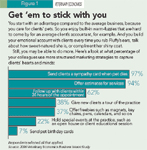Connected clients spend more dough
You want satisfied clients, of course. But pet owners who are emotionally plugged-in are better yet. Why? The strong relationship should mean that they accept more recommendations and refer more new business.
NO MATTER WHAT YOU'RE SELLING, satisfied clients who feel an emotional connection with your business deliver a 23 percent premium compared to the average customer in terms of share of wallet, profitability, revenue, and relationship growth. And, according to the research conducted by The Gallup Organization published in the July/August 2005 issue of the Harvard Business Review, actively disengaged customers represent a 13 percent discount on those same measures.
In a March 2003 article in the Gallup Management Journal, Gallup examined customers who were extremely satisfied and emotionally connected to a supermarket chain. The organization found that customers with strong emotional connections visited the store more often—and spent 46 percent more than customers that didn't feel an emotional bond with the chain. Of course, you don't run a supermarket, but you do rely on engaged customers to keep your business healthy. And the impact on your bottom line is hard to ignore. So what are you doing to make sure you bond your clients to your practice?
Serve up five-star service
Often small investments in service mean the most to clients. You've probably seen anecdotal evidence of this in your practice. And that's likely one reason that 97 percent of respondents to the 2006 Veterinary Economics Business Issues Study send clients a sympathy card when their pet dies. (See "Get 'Em to Stick With You".)

Figure 1
To learn what other strategies could put you in more clients' good graces, consider simply asking them. A small sample of practices testing VSurv, a new client satisfaction survey tool, asked clients whether their phone call was answered promptly when they called to make an appointment. Fifty-two percent said yes, almost immediately. Thirty-three percent said yes, after a few rings. And 4 percent said no, I had to hang up and call again. This type of information helps you pinpoint areas of weakness for your team.
According to the Word of Mouth Marketing Association, two-thirds of all economic activity in the United States is influenced by shared opinions about a product, brand, or service. So keep in mind that the 4 percent of clients that had to hang up and call again may tell friends about their negative experience. On the other hand, your highly-bonded, satisfied clients are just as likely to refer their friends to you.